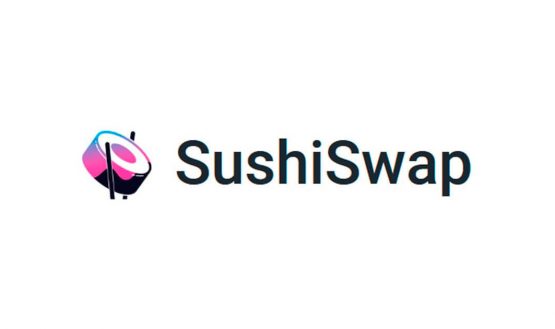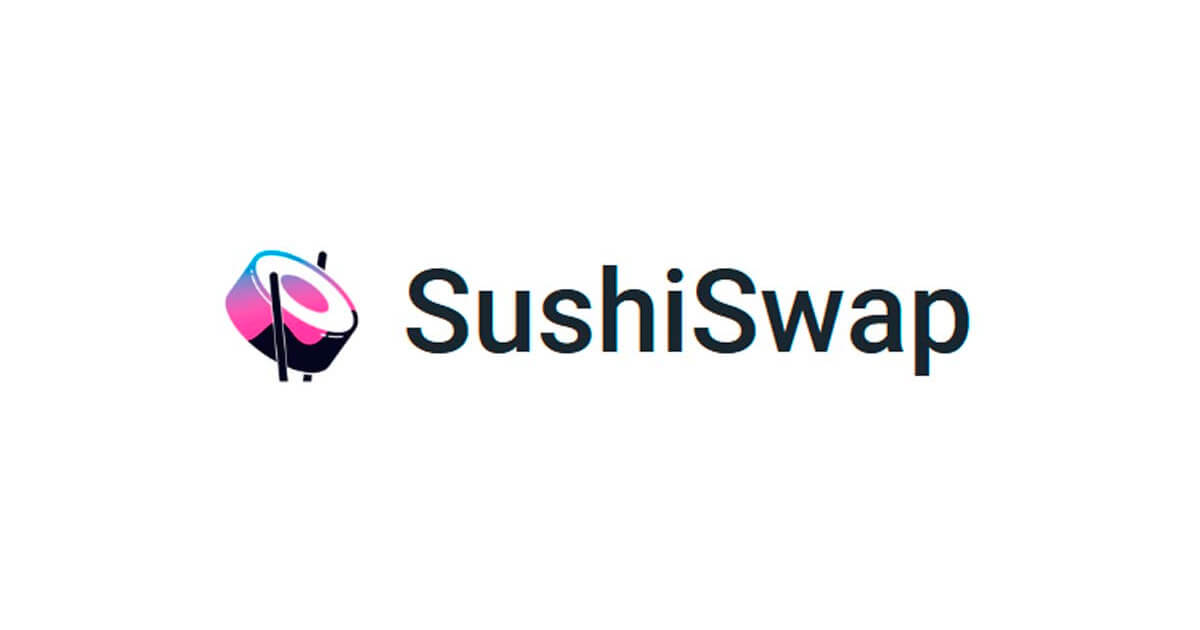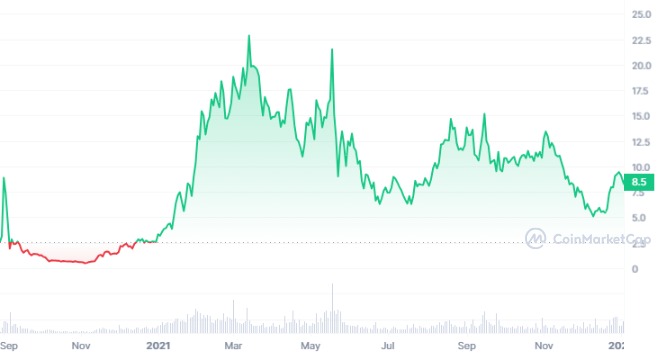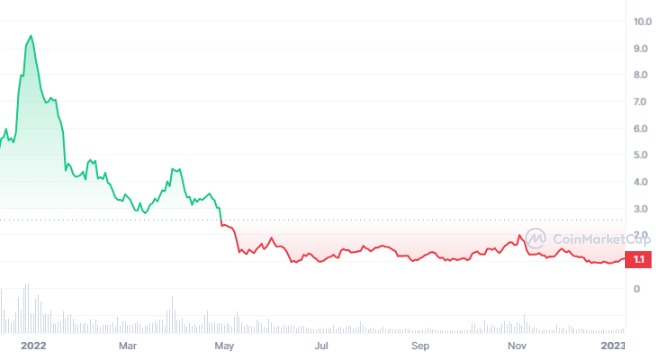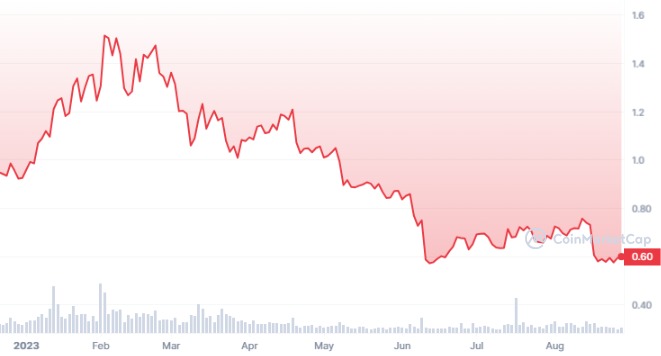SushiSwap is an Ethereum-based program that tries to incentivize a network of users to manage a marketplace where users may purchase and trade crypto assets. SushiSwap, like platforms like Uniswap and Balancer, achieves this purpose through a series of liquidity pools. Users place assets in smart contracts, and traders buy and sell cryptocurrencies from those pools, exchanging one token for another.
SushiSwap, one of a rising number of decentralized finance (DeFi) systems, allows users to exchange cryptocurrencies without a central operator administrator. SushiSwap software decisions are determined by SUSHI holders of the SushiSwap native coin. Anyone with a balance in the crypto asset can modify how it runs and vote on recommendations submitted by other users.
If you want to learn more about investing in SUSHI, this guide is a great place to start.
On this Page:
How to Buy SushiSwap
- Open an account with Binance: Go to Binance and start creating a new account. Enter the required personal details and verification documents to complete the account creation process.
- Deposit: Before trading on Binance, investors must select a valid payment method and deposit funds on the trading account.
- Buy SUSHI: Enter ‘SUSHI’ into the search field, enter the token amount, and confirm the transaction.
Compare Crypto Exchanges
Binance
Visit SiteAs with any asset, the values of digital currencies may fluctuate significantly....
Libertex
Visit Site74% of retail investor accounts lose money when trading CFDs with this provider....
Where to Buy SushiSwap – Best Platforms
SushiSwap (SUSHI) illustrates an automated market maker (AMM). AMMs are becoming increasingly popular among cryptocurrency users and are decentralized exchanges that employ smart contracts to generate markets for any specific pair of tokens. SushiSwap debuted in September 2020 as a fork of Uniswap, the AMM that has come to be associated with the decentralized finance (DeFi) movement and the related trading boom in DeFi coins. SushiSwap intends to broaden the AMM market while introducing new features not previously available on Uniswap, such as enhanced benefits for network participants via its in-house token, SUSHI.
After significant research, we narrowed down the top platforms to buy SUSHI. Our list of places to purchase SUSHI in 2024 includes their characteristics, fees, and why each one is special.
Best Brokers to Buy SUSHI
1 – Binance
Binance, launched in late 2017, is a third-party exchange platform that enables traders to buy and sell trade cryptocurrencies like Bitcoin (BTC), Ethereum (ETH), Bitcoin Cash (BNB), and hundreds more.
Even though the company’s headquarters are located on the European island of Malta, the project was started by Chinese native Changpeng Zhao (CZ).
In less than two years, Binance has become one of the largest cryptocurrency exchanges in the market. It is common for the platform to support more than $2 billion in daily trading activity. Binance was once primarily a crypto-to-crypto exchange without involvement in fiat transfers or withdrawals. However, as we will see later, today’s platform only supports bank account and credit card deposits in a restricted capacity.
Binance was once primarily a crypto-to-crypto exchange without involvement in fiat transfers or withdrawals.
However, as we will see later, today’s platform only supports bank account and credit card deposits in a limited capacity. Binance, in addition to its tools and features, offers a complete learning platform, an NFT platform, and other services. Binance provides various trading tools, including real-time charting with moving averages and exponential moving averages.
In addition, users can carry out transactions via the Binance app, the Binance website, or the Binance desktop client.
Traders can also use the Binance interface to access their portfolios and transaction history and check their order book and price charts. Stop orders, limit orders, stop-limit orders, stop market orders, and trailing stop orders are the order types available on the exchange. You can also choose from several trading views, from traditional to margin and OTC.
Binance offers a variety of trading tools, including real-time charting with moving averages and exponential moving averages. Users can transact via the Binance app, the Binance website, or the Binance desktop client. Traders can also use the Binance interface to access their portfolios and transaction history and check their order book and price charts.
Stop orders, limit orders, stop-limit orders, stop market orders, and trailing stop orders are the order types available on the exchange. You can also choose from several trading views, from traditional to margin and OTC.
Binance employs two-factor authentication (2FA) verification and deposits in US dollars (USD) FDIC-insured. Binance Exchange employs device control through address whitelisting and cold storage to protect its clients in the United States. While the prices are reasonable, clients may pay for it with little to no customer service.
Just don’t confuse this US-based exchange with its parent business, Binance, which operates outside the US. Overall, Binance – which we’ll discuss here as the US operation – provides an appealing approach to get started with cryptocurrencies.
Binance listed the SushiSwap token back in September 2020 and offers trading several pairs like SUSHI/BNB, SUSHI/BTC, SUSHI/BUSD, SUSHI/USDT,
Fees: 0.015 percent to 0.10 percent for purchase and trading fees, 3.5 percent or $10 for debit card purchases, whichever is greater, or $15 per US wire transfer.
Pros & Cons of the Binance platform:
- Over 500 coins are available for trading.
- A broader selection of cryptocurrencies.
- Professional traders have access to all the chart indicators they need
- Margin trading – Leverage on long and short trades
- A wide range of transaction types are available.
- More staking options – Binance Earn feature
- Lack of copy-trading feature
- US customers can’t use the Binance platform, and the Binance.US exchange is very limited
- High fees for credit card deposits
2 – Coinbase
Coinbase, founded in 2012 and headquartered in San Francisco, California, is an exchange broker that allows the purchase and sale of cryptocurrencies.
Coinbase, led by CEO Brian Armstrong, is frequently utilized by inexperienced investors trying to buy cryptocurrencies for the first time, not least because the platform accepts standard payment methods, including debit/credit cards, bank transfers, and even PayPal.
To demonstrate how large Coinbase has grown, the platform claims to have signed up more than 30 million members since its inception in 2012, with more than $150 billion in cryptocurrency assets traded along the way.
This has been bolstered by Coinbase’s international expansion, with the platform being available in over 103 countries globally. Because the phrases broker and exchange are frequently used interchangeably, there is often uncertainty about whether Coinbase is a broker or an exchange. In reality, they are both.
On the one hand, Coinbase’s primary brokerage services enable consumers to buy and sell cryptocurrencies directly from the site. However, because the business also provides a more traditional exchange platform – Coinbase Pro – it effectively functions as both a broker and an exchange.
Coinbase is building a solid footing in the institutional market in addition to its primary consumer-based services. This is particularly true of the platform’s custodianship services, which aim to provide institutional-grade protection for cryptocurrency assets. Coinbase’s fees can be exceedingly expensive despite its popularity, potentially affecting many of any gains you may see.
Coinbase recently announced that it receives institutional demand ranging from $200 million to $400 million weekly. However, with cryptocurrencies still in their infancy, this figure is only anticipated to rise. In terms of regulatory compliance,
Coinbase is registered with FinCEN as a Money Service Business and complies with all anti-money laundering and terrorism financing rules. This is why, while utilizing Coinbase, all customers must be identified. Coinbase is approved to operate as a Money Service Business in the United Kingdom outside of its US operations by the Financial Conduct Authority (FCA).
Coinbase permits you to trade cryptocurrencies such as Bitcoin, Ethereum, Litecoin, and over 50 more. It can also be used to exchange one cryptocurrency for another and transfer and receive cryptocurrency.
Coinbase Pro exchange allows you to set limits or market orders for SUSHI coins. The maker/taker fee varies, such as 0.5%, until you trade over $10k in volume within 30 days. Then it decreases to 0.35%. Maker fees (for limit orders) drop to zero for free crypto trading if your 30-day volume is over $300 million.
The good news is, that Coinbase listed a series of coins, including SUSHI, in March 2021. Therefore, you can trade SUSHI-USD, SUSHI-BTC, SUSHI-ETH, SUSHI-EUR, and SUSHI-GBP with the Coinbase platform.
Opening an account with Coinbase
Signing up for Coinbase is simple, like opening a new bank or brokerage account online. Plan on entering your contact information, particularly your Social Security number, to open a fully verified account. To confirm they are who they claim they are, new account holders must upload a photo of a government ID. If you’ve heard that cryptocurrency is anonymous, this is evidence that Coinbase may track your transactions for tax and regulatory purposes.
You’ll be able to buy and sell cryptocurrencies up to the limits of your Coinbase account once you’ve created your account and validated your information.
Pros & Cons of the Coinbase platform:
- Offers access to nearly 100 cryptocurrencies.
- Trade against the US Dollar, GBP, or EUR rather than USDT
- Well-known and trusted by US regulators
- Cryptocurrency is insured in the event the website is hacked.
- Instant deposits and withdrawals to/from a bank account
- Remember to use Coinbase Pro for lower fees
- Higher maker/taker fee (unless the trading volume is very high)
- The Coinbase Pro website is slow and lacks chart indicators
- Less customer support
3 – Bitfinex
Bitfinex is a popular cryptocurrency exchange where users may buy, sell, and trade various digital coins. The platform, situated in Hong Kong, was first established in 2012.
Because the platform provides a good selection of chart analysis tools, intermediate and expert traders are the most likely to use Bitfinex’s trading area.
Besides cryptocurrencies, a bank transfer is the only payment option supported for depositing and withdrawing funds. Bitfinex, like Coinbase, is one of the few platforms that allows you to short cryptocurrencies and use leverage trading tactics.
Founders – Bitfinex began as a peer-to-peer Bitcoin exchange in December 2012, providing digital asset trading services to consumers worldwide.
Giancarlo Devasini has been Bitfinex’s CFO since 2013 and has played a crucial role in the company’s growth. Giancarlo Devasini began his career as a physician, earning a Doctor of Medicine degree from Milan University in 1990.
Is Bitfinex regulated?
Bitfinex Securities Ltd., a provider of blockchain-based investment products, has opened its regulated investment exchange in the AIFC (Bitfinex Securities), intending to enhance members’ access to a broad range of financial products. Thus, Bitfinex isn’t regulated in any way. The corporation is based in Hong Kong and is registered in the British Virgin Islands.
Fees and deposit limits – Bitfinex charges a 0.1% fee on deposits via bank transfer. For example, if you deposit $10,000, you will be charged a fee of $10. If you deposit using cryptocurrency, you will be charged a modest fee, determined by the individual coin you use to fund your account.
Fees for withdrawals – Bitfinex charges a 0.1% fee on withdrawals via bank transfer. If you require funds within 24 hours, you can pay a 1% expedited fee. Alternatively, bitcoin withdrawal costs differ by coin.
Bitfinex listed Sushi (SUSHI) on Jan 11, 2021, and enabled trading against USD and USDt, with margin and funding markets set to be enabled as sufficient liquidity develops.
Pros & Cons of the Coinbase platform:
- Established in 2012.
-
Suitable for experienced traders.
-
Over 100 coins are supported.
-
Bank wire deposits and withdrawals are accepted.
-
There is no regulation.
-
US citizens are not accepted.
-
Expensive trading fees
- Hacked on more than one occasion
- The support team is only available via email
4 – KuCoin
KuCoin, founded in 2017, is a global cryptocurrency exchange that offers its eight million members various trading options. Spot, margin, futures, and peer-to-peer trading, as well as lending and staking, are all examples.
KuCoin claims to provide the highest level of security and a cryptocurrency variety of around 400. It is a user-friendly exchange with a simple layout despite its extensive functionality.
In addition, Kucoin Exchange has some of the lowest costs in the cryptocurrency business.
Founders – Johnny Lyu is the Co-Founder and CEO of KuCoin, one of the world’s most popular cryptocurrency exchanges. KuCoin has become one of the most popular cryptocurrency exchanges, with over 8 million registered users from 207 countries and territories worldwide.
KuCoin raised $20 million in round A funding from IDG Capital and Matrix Partners in November 2018 and was listed as one of the Best Crypto Exchanges of 2021 by Forbes Advisor in 2021.
KuCoin Deposit – There is only one option for depositing and withdrawing money from Kucoin. You must fund your cryptocurrency account because the network does not accept fiat currency.
- Only cryptocurrency deposits and withdrawals are accepted.
- Payments via debit/credit card, bank account, or e-wallet are not accepted.
Trading Fees – Kucoin’s trading fee structure is pretty straightforward. The platform charges 0.1 percent to both makers and takers, making it one of the cheapest cryptocurrency exchanges online. If you own the platform’s native Kucoin Shares tokens, you can further minimize your fees.
KuCoin listed SushiSwap (SUSHI) on Jan 22, 2021, and supported trading pairs, including SUSHI/USDT.
Pros & Cons of the Coinbase platform:
- User-friendly exchange
- Low trading and withdrawal fees
- Vast selection of altcoins
- Ability to buy crypto with fiat
- 24/7 customer support
- No forced Know Your Customer (KYC) checks
- Ability to stake and earn crypto yields
- Complicated interface for newbies
- No bank deposits
- No fiat trading pairs
5 – Bybit

The Bybit team includes ex-Morgan Stanley employees, Tencent, and other well-known organizations, all of which can be found on LinkedIn.
Bybit exchange primarily provides perpetual futures products with 100:1 leverage. This suggests they’re attempting to compete with established exchanges like Binance and Phemex, which provide similar non-expiry futures contracts.
While the exchanges have several similarities, Bybit has certain distinct advantages over its competitors. For example, we shall touch on these features when we discuss their trading technology.
Most traders from all over the world may use the exchange, and the platform has been translated into English, Chinese, Korean, Japanese, and Russian; however, there are some jurisdictions where Bybit does not operate, such as the United States, Syria, and the Canadian province of Quebec.
Founders – Ben Zhou founded the company in March 2018. Before becoming the exchange’s CEO, he was the general manager of a forex brokerage business called XM. Ben Zhou assembled an a-team of investment banking and fintech experts working for Alibaba, Tencent, Morgan Stanley, and other well-known companies.
This is why the Bybit exchange now includes blockchain professionals and seasoned currency traders. With over 3 million registered members, Bybit is one of the fastest-growing cryptocurrency exchanges.
Trading – BTC, ETH, EOS, XRP, and USDT are the five cryptocurrencies supported by Bybit. By default, each asset will have a wallet, but Bybit will calculate your equity in BTC.
If you have any of the above coins stored differently, you can transfer them to your Bybit wallets and begin trading with them. You can use the Fiat Gateway to buy crypto with Bybit. The Fiat Gateway accepts Bitcoin, Ethereum, and USDT, as well as 45 fiat currencies such as the US dollar, Australian dollar, Euro, and GBP
Market takers are charged 0.075%, while the maker fee is -0.025%. So it means when a market maker opens a trade, they will get paid to do this. This very competitive fee encourages market makers to be active and make the order book.
Pros & Cons of the Coinbase platform:
- Up to 100x leverage on crypto
- Advanced tools supported by great technology
- Risk-free test environment to learn and experiment
- Educational resources
- Not available in the US
- Crypto derivatives are extremely risky
- Not suited to spot trading
- May share your data with third parties for marketing
What is SushiSwap?
SushiSwap is a decentralized exchange based on Ethereum that allows you to swap a wide range of tokens and engage in other financial activities. There are no centralized authorities or middlemen in this system. Instead, it completes trades using smart contracts—code that automates processes—and liquidity offered by other users.
SushiSwap is comparable to Uniswap, also based on Ethereum, and PancakeSwap, built on the Binance Smart Chain. SushiSwap debuted in August 2020 and immediately sparked controversy. It swiftly grew in value to well above $10 per token. Since then, the token has stabilized under $1 before resuming its upward trajectory in 2021 with the crypto bull market.
SushiSwap has a market capitalization of approximately $1.5 billion and is currently trading at around $15. Chef Nomi and his collaborators cloned (or forked) the open-source code from Uniswap, but with one major difference: the addition of SUSHI, a governance token that users could buy and earn to have a say in the DEX’s development.
How Does It Work?
SushiSwap’s primary function is to facilitate decentralized cryptocurrency trading. SushiSwap accomplishes this by using Automated Market Makers (AMMs), smart contacts that build and manage token liquidity pools and set token prices using algorithms or mathematical formulas.
Is it Worth Buying SUSHI in 2023?
SUSHI has been one of the most popular and innovative projects in the DeFi space, attracting many investors and traders. But how has its price performed over time? Let’s take a look at the historical price of SUSHI from 2021 to 2023.
SUSHI was launched in August 2020 as a fork of Uniswap, another popular DEX. It quickly gained popularity due to its novel feature of rewarding liquidity providers with SUSHI tokens, which could also be staked to earn more rewards. SUSHI started trading at around $0.7 and reached an all-time high of $15.8 in September 2020 amid a surge of interest in DeFi. However, it also faced some controversies, such as the sudden sell-off of SUSHI tokens by its anonymous founder, Chef Nomi, who later returned the funds and apologized.
SUSHI entered 2021 with a price of around $3 after recovering from a market crash in November 2020. It followed the bullish crypto market trend and reached a new all-time high of $23.4 in March 2021, as SushiSwap launched new features and integrations, such as BentoBox, Kashi, Onsen, and MIRIN. SUSHI also benefited from the growing popularity of yield farming and liquidity mining and the expansion to other blockchains, such as Binance Smart Chain, Polygon, Fantom, and xDai.
However, SUSHI also faced some challenges in 2021, such as hacking its MISO platform, which resulted in the loss of $3 million worth of ETH and SUSHI tokens. It also experienced a sharp correction in May 2021, along with the rest of the crypto market, dropping to around $7. It then traded sideways for several months, fluctuating between $6 and $10, until it regained momentum in August 2021, reaching $15 again.
SUSHI continued its downward trend in 2022 despite network developments like SushiSwap launching more products and partnerships, such as Trident, Shoyu, Misoba, and Benten. It also benefited from the increasing adoption of DeFi and DEXs and the launch of Ethereum 2.0, which improved scalability and reduced fees. But concluded 2022 at the price of $0.09.
SUSHI started a promising momentum in 2023, as SushiSwap became one of the leading DEXs in the market, competing with Uniswap and PancakeSwap. It also expanded to more blockchains and ecosystems, such as Solana, Avalanche, Polkadot, and Cosmos. SUSHI recovered to $1.51 in Feb 2023 but couldn’t hold the position and fell down.
As of today, SushiSwap is trading at $0.60 with a 24-hour trading volume of $14 million. SUSHI is up 1.24% in the last 24 hours. The current CoinMarketCap ranking is #161, with a live market cap of $139 million. It has a circulating supply of 231 million coins and a max. Supply of 250 million coins.
Will the Price of SushiSwap (SUSHI) Go Up in 2023?
What about the future price of SUSHI? While it is impossible to predict with certainty, some analysts and experts have made their own forecasts based on various factors and models. For example,
- DigitalCoin predicts that SUSHI will reach $58 by the end of 2023
- WalletInvestor predicts that SUSHI will reach $62 by the end of 2023
- TradingBeasts predicts that SUSHI will reach $66 by the end of 2023
In recent months, SushiSwap has experienced notable developments that encompass surprises, advancements, and a robust forward trajectory. The retirement of the Trident experiment stands out, marked by its intriguing yet tumultuous nature and its inability to captivate liquidity providers (LPs) seeking flexibility and efficient markets.
2️⃣ SushiSwapV3 has been deployed across 20 networks, with 5 more networks in the pipeline, making it the most widely available version so far. It has shown steady and organic growth in Total Value Locked (TVL) and trading volume since its launch
— Sushi.com (@SushiSwap) June 28, 2023
SushiSwapV3, on the other hand, has achieved remarkable deployment across 20 networks, with 5 more networks in the queue, establishing its status as the most widely accessible version. Since its launch, SushiSwapV3 has demonstrated consistent and organic growth in both Total Value Locked (TVL) and trading volume.
As part of a strategic evolution, the sunsetting of MasterChef and MasterChefV2 has been decided upon. Despite their innovative aspects, scaling for multi-rewards has proven challenging, and these mechanisms have not efficiently incentivized beyond liquidity mining, thereby becoming internal technical burdens.
Shifting focus, SushiSwap is adopting Angle Protocol’s Merkl solution, a pioneering approach enabling potentially boundless rewards within a single pool. This not only amplifies TVL incentives but also enhances liquidity efficiency.
Merkl’s implementation is underway across Ethereum, Arbitrum, Optimism, and Polygon, with a parallel reduction of incentives on SushiSwapV2 pools through MasterChef. Anticipating the future, the spotlight is on Sushi Smart Pools, developed in collaboration with Steer Protocol. Featuring a selection of strategies (currently nine, with more in the pipeline), these pools will seamlessly integrate into the Sushi app.
The evolution of the RouteProcessor DEX aggregator is noteworthy, with RouteProcessorV3 live and V4 in progress. The goal is to encompass a majority of market liquidity sources by the end of Q3, enhancing trade competitiveness and token selection for Sushi users. Furthermore, SushiXSwapV1’s year-long operational success paves the way for SushiXSwap V2, which promises expanded cross-chain swap capabilities through RouteProcessor integration.
In spite of challenges, Sushi’s autonomy is a source of pride, operating for two years without external funding. The team’s unflagging commitment to innovation and enhancement persists. The culmination of recent developments within SushiSwap is poised to exert a discernible influence on the future trajectory of the SUSHI token price as well.
When you’re considering an investment, follow these things:
You must select a crypto broker carefully. How are you going to do that? When looking for a cryptocurrency broker to start with, look for the following features:
1. Stable financial support: Regarding trading, you don’t want to work with a broker whose asset base is similar to your investment. A competent crypto broker has a robust financial foundation, which implies that they must have a substantial cash basis of their own. This ensures your cryptocurrency is secure, and the broker will not go out of business.
2 – Great trading platform: Crypto trading, like forex trading, demands that a broker’s trading platform be simple to use and loaded with advanced features. The trading platform should simplify for crypto traders to manage their accounts, do technical analysis, execute market trades, and stay current on the latest crypto news. Because cryptocurrency is so much more volatile than any other market, the trading platform needs to be able to react quickly.
3 – Credibility, reliability, and experience: The crypto market is new compared to other markets, but it doesn’t mean every broker you come across is unskilled. You can employ crypto brokers who are reputable and knowledgeable. They have the necessary qualifications, such as licenses from well-known and respected regulatory authorities and professionals on their team. You can read reviews about the broker and learn more about their services to see whether they are a good fit for you
4: Crypto brokers’ customer service: Crypto trading is available 24 hours a day, seven days a week, which means you can have a problem or query anytime. As a result, it’s essential to look for a broker available 24 hours a day, seven days a week. In addition, they should have knowledgeable support staff that can respond to questions and concerns promptly and professionally, regardless of the time zone.
5: Commissions and fees: Last but not least, you should look into the commissions and other costs that crypto brokers impose. Ensure the broker explains the fees they charge and any other hazards involved so you can make an informed decision.
Buying SUSHI as a CFD Product
In the financial and investment markets, contract for difference trading is known as CFD trading. It’s a strategy that allows somebody to trade and invest in an asset by starting a contract with a broker rather than opening a position directly in a specific market. When the position finishes, the investor and the broker agree to mimic market circumstances and settle their differences.
CFD trading has made its way into the cryptocurrency industry; therefore, it’s now available as a CFD product. If you’re struggling with following Bitcoin trading with the exchange where you keep your crypto funds, you may use CFDs to profit from SUSHI.
We recommend trading altcoins with leverage on Binance or CryptoRocket. Binance supports more altcoins, including SUSHI. Whereas, CryptoRocket supports fewer altcoins, currently about 40. SUSHI isn’t available on Cryporocket, but they are consistently adding new coins.
There is a SUSHIUSD trading pair on derivatives broker Libertex, which we also recommend. However, if you are based in the UK, they will no longer offer cryptocurrency instruments to retail clients in the UK beginning in January 2021.
Taxation on SUSHI Earnings
Crypto traders may have severe tax concerns as the value of various cryptocurrencies, such as Bitcoin and Ethereum, has skyrocketed. With the Internal Revenue Service (IRS) ratcheting up enforcement operations, even people who hold the currency — much alone trade it — must be careful not to break the law. Given how the IRS views cryptocurrency, this may be easier than you think.
“Right now, it’s a fairly huge enforcement area for the IRS,” says Brian R. Harris, a tax attorney at Fogarty Mueller Harris, PLLC in Tampa. “They’re getting much attention for going after people who own, trade, or use cryptocurrency.” Those people could be audited or checked for compliance.”
While Bitcoin’s anonymity (or at least semi-anonymity) has been one of its selling features, authorities have been trying to catch up in recent years with some success.
“The IRS and FBI are becoming more adept in tracking and tracing Bitcoin as part of criminal investigations,” Harris argues. They can also freeze assets if necessary, he adds.
As a result, persons who transact in cryptocurrencies should be aware of the law and any taxes that may be incurred due to their conduct. The good news is that the IRS treats cryptocurrencies like conventional capital assets such as stocks and bonds. The bad news is that this treatment also makes using cryptocurrency to purchase products and services harder.
What are crypto assets?
Crypto assets are digital assets that use cryptography techniques to generate a financial transaction medium of exchange. Crypto assets include cryptocurrencies, utility coins, and security tokens. A cryptocurrency is a virtual or digital currency. To safeguard financial transactions, manufacture new units, and validate asset transfers, the money is encrypted (secured) using cryptography.
Crypto assets represent a seismic shift in financial markets and have recently achieved fame. Cryptoasset technical innovations have come a long way and can potentially upset the financial system as we know it. Central banks and other financial institutions can help shape this landscape. However, this worldwide phenomenon is causing uncertainty on numerous levels, including how individual crypto assets differ and the performance of the principal participants in the crypto-asset ecosystem. In addition, an entirely new financial environment has begun with the hype surrounding Bitcoin, altcoins, cryptocurrencies, and tokens.
As more organizations in the capital markets cope with the ramifications of crypto assets, fees and regulatory ambiguity continue to concern traders, even as crypto asset marketplaces expand the variety of fiat currencies they support. In addition, the taxonomy of crypto assets, market participants, and the present capital market landscape are all covered in this whitepaper.
The Internal Revenue Service (IRS) issued IRS Notice 2014-21 and IRB 2014-16, presenting direction for individuals and companies on the tax practice of virtual currency transactions. The IRS recognizes virtual currencies as bitcoin property, which implies that they are taxed similarly to stocks or real estate. If you receive BTC for $10k and sell it for $50k, you must pay $40k in capital gains taxes.
However, traders with BTC as a capital asset and not in the trade or business of selling cryptocurrency might find answers in the IRS’s Frequently Asked Questions on Virtual Currency Transactions.
SushiSwap trades in the United States are taxed like any other crypto-to-crypto trade. In the United States, all crypto-to-crypto and crypto-to-FIAT trades are taxable. The SushiSwap allows you to swap one token for another, a crypto-to-crypto trade that the IRS considers a taxable event. Determine your cost basis when you purchased the original coin to determine your capital gain or loss on the crypto-to-crypto trade. A deal’s capital gain or loss is calculated as the difference between the sales revenues and the cost basis.
Even though SushiSwap and other decentralized exchanges provide anonymity to their users, the taxable events when using such exchanges remain the same. Therefore, the need for crypto tax reporting is the same if you use other prominent DEXes like Uniswap. Yes, you must pay taxes while trading crypto on decentralized exchanges.
Beyond crypto trading, Decentralized Finance (DeFi) encompasses a wide range of crypto activities. Staking rewards, earning interest, taking crypto loans, joining a liquidity pool, and many other options are available. Any crypto trades you conduct on a DeFi protocol will result in capital gains that will be taxable. Other activities, such as growing interest in cryptocurrency or obtaining cryptocurrency staking rewards, will increase your overall taxable income for the year.
Automated Trading With Robots
An Expert Advisor, often a trading robot, is a computer-based trading software that trades for you in your account. Selling robots and EAs online has become a massive business, but there are several things to consider before diving in. There are some advantages to automating a plan, but there are also some disadvantages. The critical thing to remember is that making much money is rarely easy. The promise of quick money is the oldest trading deception in the book.
Trading robots and learning to automate tactics can help you make money. Unfortunately, learning how to trade efficiently may take longer than merely learning how to trade manually because a person must first learn how to trade and then learn how to automate the methods using a programming language. Purchasing a program comes with many dangers, which will be covered shortly. We’ll look at all of this and more below, as well as the benefits and drawbacks of robotic trading and EAs.
What Is EA Software or Automated Software?
Expert Advisors (EAs), robotic trading, automated trading, and black box trading are all names for automated trading software. Automated software is a program that runs on a computer and performs tasks in place of the person running the program. Because it is a program, it will only accept trades with parameters that match what is specified in the program. Developing a trading program necessitates substantial trade expertise as well as programming abilities.
Because EAs are based on a trading strategy, they must be basic enough to be broken down into rules that can be programmed. The more complex a strategy, the more difficult it is to program effectively. People who purchase trading software rely entirely on the trading and programming skills of the individual who created the program. This is a serious situation to be in.
It, like any software, will need to be updated from time to time. Market conditions fluctuate, and trading software must be updated to reflect this. If the software is not maintained by someone who knows what they are doing, it will likely have a concise profitability shelf life (if it was profitable, to begin with). EAs built and maintained by experienced traders and programmers have the best chance of remaining profitable in the long run.
Decreasing Risk when Investing in SUSHI
SushiSwap is a well-known decentralized exchange, and the SUSHI token has done well since its inception. If you’re considering buying it, watch comparable tokens in the DeFi market and read up on any regulatory developments. You’ll get the most out of the token if you have a basic understanding of decentralized finance. Cryptocurrency wallets (digital wallets) and exchange providers are the primary threats to your digital coins.
A crypto wallet does not store your digital money but contains a private key that allows you to exchange cryptocurrency over the web. This private key serves as your digital identity on the cryptocurrency market, and anyone who obtains it can carry out fraudulent transactions or steal your money. Cybercriminals employ complex approaches to hack digital wallets and steal or transfer crypto assets without the user’s awareness. When protecting your digital cash from hacks, securing your wallet is critical.
1- Use a cold wallet
Unlike hot wallets, cold wallets are not connected to the internet and hence are not vulnerable to cyberattacks. Keeping your private keys in a cold wallet, also known as a hardware wallet, is the safest choice because these wallets are encrypted.
2 – Use a Secure Internet Connection
Use a secure internet connection and avoid public Wi-Fi networks when trading or conducting crypto transactions. Use a VPN even when connecting to your home network for added security. Your IP address and location are changed using a VPN, which keeps your internet behavior safe and confidential from malicious attackers.
3 – Maintaining Multiple Wallets
You can diversify your cryptocurrency investments using numerous wallets because there are no restrictions on wallet creation. Instead, use one wallet for daily transactions and another for everything else. This will keep your cryptocurrency assets secure and reduce the risk of a security compromise.
4- Protect Your Device:
To protect against newly identified vulnerabilities, ensure your device is up-to-date with the latest antivirus programs. A robust antivirus and firewall prevent hackers from exploiting the flaw by building programs to target the vulnerability to increase your device’s security.
5 – Change your password regularly
Regarding security, the value of a strong password cannot be overstated. According to research, three-quarters of millennials in the United States use the same password on more than ten different devices, applications, and social media accounts. The report said most also used the same password on over 50 sites. Remember that you have a strong, complicated, and difficult-to-guess password that you change regularly. For example, if you have many wallets, use different passwords for each. Use two-factor authentication (2FA) or multi-factor authentication (MFA) for added protection.
6: Keep researching: Market research will help you understand and prepare for market movements. You can gather the necessary information by using survey sites and expert recommendations.
SushiSwap Price Predictions: Where Does Sushi Go From Here?
SUSHI coin started the year with a price below $1, reaching as high as $1.57 at the beginning of February. At the time of writing, SUSHI’s value is a bit lower compared to its price in February, but the coin has proved that it will follow the market uptrend if this happens in the near future.
SUSHI is a promising cryptocurrency project and is one of the most popular decentralized exchanges in the crypto space. It means that SUSHI has a lot of room for growth if it continues working on its project and develops its platform. Let’s look at the SUSHI price projections for the next few years.
SushiSwap Price Prediction 2023
There are controversial predictions about how SUSHI will perform during 2023. According to Price Prediction, SUSHI will have an average price of $1.58, and its maximum price can reach $1.76. Digital Coin is more optimistic and predicts that SUSHI can grow up to $2.30 as an average price with a maximum price of $1.03 and a minimum price of $2.52. Wallet Investor is pessimistic about SUSHI prices and suggests that the coin can drop to $0.0540 during 2023.
SushiSwap Price Prediction 2024
If the crypto market recovers and SUSHI grows its adoption, the coin could be on a bullish run in the next few years. However, a downtrend can also happen, so you must be cautious when investing in cryptocurrencies. According to algorithm-based platforms, SUSHI is likely to increase in value rather than decrease. Its price is predicted to hit $2 during 2024.
SushiSwap Price Prediction 2025
SUSHI is a valuable crypto project and has excellent growth potential. However, it all depends on its upgrades, crypto market direction, and many other factors. In any case, SUSHI is a promising crypto in the long-term perspective, and its average price can reach $3.47 in 2025 with a minimum price of $3.36 and a maximum price of $4.02.
SushiSwap Price Prediction 2026 – 2030
Sushi prices will grow steadily, according to the analytical platforms. In 2026 SUSHI can have an average price of $4.89-$5, and its maximum price can hit $5. The price Prediction forecast indicates that in 2028 SUSHI can be traded above $10, while Digital Coin Price suggests this could happen only in 2030. However, according to Price Prediction, in 2030, SUSHI will already be traded high above $20.
Summary
SushiSwap went from around $2 in price at the opening of 2021 to an all-time high of $23 a few months later, making it a 10x altcoin – one that went up over 1000%. At the time of writing, the price is currently trading at a discount of around $1.14.
There are several ways to invest in SushiSwap if you think SUSHI will increase in price again in 2023 in another bull run. We recommend opening an account on a regulated exchange, such as Binance, or Coinbase, as the most convenient option to buy SUSHI.
Your Capital is at Risk
FAQs
Any risks in buying SushiSwap now?
If you're thinking about investing in SUSHI, you should be prepared for volatility and risk. All cryptocurrencies are dangerous investments, but small coins such as SUSHI are particularly riskier. They are incredibly volatile, which means you could make a lot of money, but you could also lose a lot of money.
Should I buy SushiSwap?
The current CoinMarketCap ranking is #161, with a live market cap of $138 million. It has a circulating supply of 231,014,958 SUSHI coins and a max. Supply of 250,000,000 SUSHI coins. There's a strong potential for an upward trend continuation, and as per forecast, Sushi can be traded above $2 during 2024 and hit $22 by 2030.
Where can I spend my SushiSwap?
The SushiSwap isn't a very popular coin yet. It can't be used to purchase via e-commerce or retail directly. However, you can always convert them into Bitcoin and other altcoins to make a direct payment online.
Is it safe to buy SushiSwap?
SushiSwap had some problems at first, such as weak security and unchecked inflation. This is why the creator could easily withdraw the money from the investors. However, the CEO's actions aided the platform in correcting its faults. It has become more decentralized and secure.
Will SushiSwap ever hit $500?
Sushi has an optimistic outlook, but it will be challenging for Sushi to reach $500 anytime soon. According to our long-term forecast, Sushi prices could reach $20 in the next four years.
